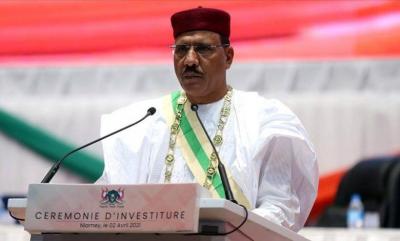The coup in Niger has raised new security concerns, as the situation in Sudan shows no signs of improvement, and neighboring countries like Chad have their uncertainties about the region's future if things spiral out of control and extremist groups exploit the critical phase in the African continent. Will Niger escape the dire fate of Sudan?
In April 2021, the elected President of Niger, Mohamed Bazoum, took the oath of office in a ceremony in the capital Niamey, marking an unprecedented political event in the country’s history since its independence from France 60 years ago. This event saw the peaceful transfer of power from one elected civilian president to another in one of the world's poorest countries, a significant step credited to the outgoing president Mahamadou Issoufou, who did not amend the constitution to run for a third presidential term, unlike several African leaders.
Bazoum's victory in the presidential elections at that time was considered a defeat for tribal affiliations in favor of political alliances, making him the first president from the Arab minority in the country's history.
Mohamed Bazoum—or "Abou Azoum" as his friends call him—was born in the Diffa region in the southeastern part of Niger, near the border with Nigeria in 1960, the same year the country gained independence from France, just eight months after Bazoum’s birth.
Bazoum hails from the Arab Ouled Slimane tribe, a branch of which resides in Niger, while the majority of the tribe is concentrated in southern and central Libya. His opponents attempted to exploit this tribal affiliation against him during the presidential elections, accusing him of foreign origins.
Regarding his upbringing, Bazoum stated during his election campaign: "I was born in the woods, if you will. We’ll say in the countryside. My connection to the countryside is a natural one, as I was born in a tent, and I never saw a building, even if it were a hut or made of straw, because we only use tents in my original environment. The first time I saw a mud house or a concrete house was when I went to get my certificate of completion from primary school in Gouré."
He continued: "I grew up in a pastoral environment, where a person lives in complete integration with animals; our main food was camel milk, which we only had for breakfast and dinner, while the midday meal was the only occasion we prepared something other than milk."
Bazoum believes that this was the reality of the pastoral community in the 1960s in Niger, "and this was true for my community, and I think this lifestyle leaves its marks. The effects of childhood, in particular, are a connection to nature and animals. I lived particularly with camels, and secondly with cattle in an almost familial relationship, as we love our cows and camels like we love humans, and when an animal dies, we feel the same sadness as when a person dies. Thus, the relationship between man and animal was more than just passion."
Leftist Tendencies
Bazoum entered the political arena early, becoming the Minister of State for Cooperation in the transitional government of Prime Minister Hamadou Seyni from 1991 to 1993.
Bazoum had a long historical relationship with the outgoing president Mahamadou Issoufou, as he co-founded the "National Democratic Social Party" in 1990, and later assumed its presidency in 2011 after Issoufou took the presidency, according to the rule that the head of state does not participate in party politics.
Beginning of Disputes
Disputes began with the presidential guard when rumors circulated about the possibility of the president dismissing the head of the guard and several of his associates, which led the head of the guard to surround the presidential palace, signaling the start of a coup.
According to General Omar Chehiani, head of the presidential guard in Niger, who is holding President Mohamed Bazoum, the events were coordinated with former president Mahamadou Issoufou.
He said: "The situation is very complicated, and it is difficult to intervene militarily to free President Mohamed Bazoum due to the high anticipated human cost. The presidential guard has surrounded the inner circle of detained President Bazoum and has arrested at least five ministers and senior officials."
Unrest
If Niger falls into severe unrest, it will result in increased activity among terrorist groups in Niger and neighboring Sahel countries. This will also provide more opportunities for illegal migration gangs that engage in smuggling across the borders between Niger, Chad, and Mali to North Africa and the shores of Europe.
Niger is a key ally of Western powers seeking to help combat insurgency but is facing growing hostility from the new military ruling council in both Mali and Burkina Faso. It is also a major ally of the European Union in the war against irregular migration from sub-Saharan Africa.
Will the army intervene to rescue the detained president, and who will pay the price? Developments remain dependent on negotiations that seem complicated and risky for the president's life itself.




